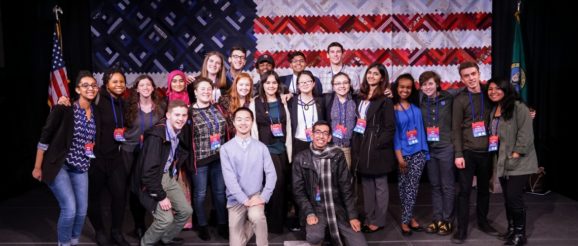Youth Collaborate on Civic innovation

Citizen University is building a culture of powerful, responsible citizenship across the country. They envision a great civic revival across our nation — their dream is a country in which Americans are steeped in a sense of civic character, educated in the tools of civic power, and are problem-solving contributors in a self-governing community. One of their programs, the Youth Collaboratory empowers and connects a rising generation of civic leaders and doers. 24 highly-motivated students from around the country join Citizen University and travel to cities around the nation, meeting leading civic innovators, sharpening their literacy in citizen power and producing their own independent projects in their communities for one year. Clara Nevins, from the very first cohort shares her story.
“I didn’t find out about the inaugural Citizen University (CU) Youth Collaboratory until hours before the application was due, but something told me that I’d be missing out on something big if I didn’t throw my hat into the ring. Civic innovation? A political incubator? Sure I had heard these words, but never together in a single phrase. I was deeply intrigued. When I was in high school I co-founded an organization called Bridge the Divide with the goal of helping my generation to be less politically polarized. By providing an online discussion platform, organizing global conferences, and facilitating roundtable discussions, we stimulate conversation between young people across party lines in a productive and respectful manner. I hoped that participating in this new program could further my work with Bridge the Divide.
The application explained that CU was putting together a group of highly motivated high school sophomores and juniors from across the country to serve as youth participants in their quarterly “Civic Collaboratory” meetings. I learned that collaboratory was a mash-up of the words, “collaborative” and “laboratory,” suggesting that it’s a space for collaboration and experimentation. These meetings serve as a common platform and project incubator for catalytic leaders in tech, government, education, and media. They had decided to include young people in the meetings. A few weeks later, I found out I was in. In the next year I would be traveling to meetings in Seattle, Detroit, and Chicago.
Throughout the three collaboratory convenings, I found myself in rooms with people I never would have encountered, having conversations that challenged my preconceived notions of civic power and citizenship.
At the time I had no idea that many of these people would later become my greatest friends and mentors or that I would run into them at almost any political gathering. The meetings dove deep into the state of democracy in America and allowed me to reflect on what’s broken in our country and what we need to do to fix it. Despite the heaviness of our conversations, the collaboratory pushed us steadfastly in a positive and solutions-oriented direction. Together, we tried to reimagine our political landscape.
It has been almost three years since the program ended and I remain close to the friends I made at Citizen University. We are all cheerleaders and sounding boards for each other. The last three years have been incredible for Bridge the Divide. With the help of people I met through Citizen University, we were able to host our own national conference and to speak at several conferences around the country. I just took a gap year to continue my work with Bridge the Divide, specifically to find a way to make the organization sustainable before I head to college. I was nominated by John Steiner, a longtime Civic Collaboratory participant and influential figure in the political bridging movement, for a grant from Facebook’s Community Leadership Program that has allowed me to continue and amplify my work. I never would have met John if it weren’t for Citizen University. In the fall of 2018, we received the grant and began working on the next stage of Bridge the Divide.
The grant enabled me to partner with another great organization affiliated with Citizen University, AllSides, to create Mismatch. Mismatch is a web-based video platform that connects people “across distance and divides.” It works like a dating site by matching classrooms, civic groups, and individuals and guiding them through carefully structured online video conversations that enable mutual understanding and relationships across differences. It frees them from their own filter bubbles and engages them in the practice of free speech and respectful discourse.
Mismatch has just been piloted successfully in 20 U.S. classrooms, from the 7th grade to the college level. Over 300 students participated in the pilot, conducting remote conversations on topics ranging from free speech to immigration to guns. For every conversation in the pilot, two classrooms were “mismatched” based on their self-described geographic, socioeconomic, ethnic, and political profiles. 98% of students said that they would want to participate in another Mismatch conversation. Several teachers remarked that Mismatch is exactly what is needed right now.
We’re currently searching for our next round of funding for the 2019-2020 school year. It has been so enriching and rewarding to work on Mismatch, and none of it would have been possible without the people I met through Citizen University. The seeds of Mismatch were planted in those small conference rooms in Seattle, Detroit, and Chicago where, as a junior in high school, I got to engage with and learn from trailblazers in the world of politics and civic tech. As a young person, Citizen University gave me a seat at the table and the chance to dream about the ways in which I could have a role in mending our broken democracy.”
